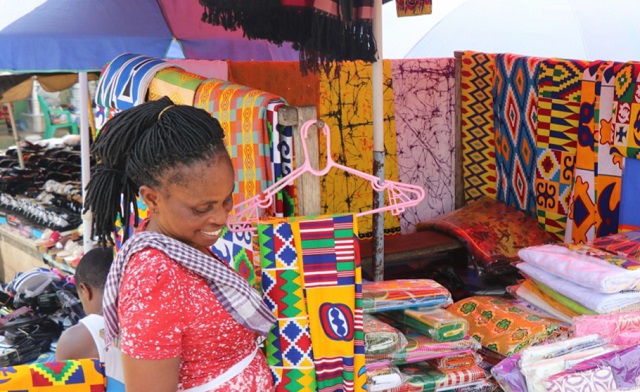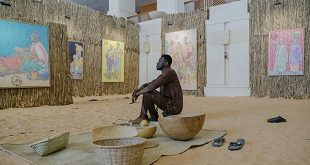
Interview with Wamkele Mene, Secretary General, African Continental Free Trade Area Secretariat (AfCFTA)
Wamkele Mene was recently appointed Secretary General of the African Continental Free Trade Area Secretariat. Because of COVID-19, free trade for countries that have ratified the agreement did not begin, as planned, on 1 July 2020. In this interview with Africa Renewal’s Kingsley Ighobor, Mene explains the way forward, how increased intra-African trade can boost economies post-COVID-19 and how digital trade will be next big thing on the continent:
You have said that digital trade is the next big thing in Africa. Most of the trade in Africa is informal and is usually carried out by women, especially cross-border trade. How does digital trade fit that picture?
First, digital trade is possible through mobile phones. We know, for example, from the experiences of various countries across the African continent, that you can access distant markets using your mobile phone. So, the digital platforms are already there. We also know that Africa has one of the fastest-growing penetrations of mobile subscribers. It is a question of leveraging all those technological innovations and advantages into a common platform for free trade in Africa, under the AfCFTA agreement.
In countries where women are most active and contribute significantly to the economy—I am thinking here of Kenya and Nigeria, among others—there are examples of women who use digital solutions in informal trade. We seek to establish the requisite regulatory environment and architecture, through laws and digital platforms. The other area that is very important is customs authorities. We need to find a way to digitize our customs capabilities such that they are seamless across the continent. It is going to take quite a lot of work, but I believe it’s possible.
Do you have any plans to capture the imaginations of young people, to bring them on board?
During my appointment and election process, I identified young Africans and women in trade as segments of society that we must bring with us, to benefit from the implementation of this agreement. If it benefits only the big multinational corporations in Africa, it will have failed. We are going to create a platform to engage young Africans, women in trade and small- and medium-sized enterprises in a dialogue to put this vision into practice. We don’t have all the answers. We want to hear from young Africans. We know that if you go to Kigali, you will find young African software engineers at the forefront of innovation. These are the people that we want to bring into the fold of the agreement. We can create the appropriate environment for young Africans to benefit. Our rule will be to establish the conducive environment for young Africans to leverage their ideas. This is especially important. We don’t have the answers to innovation, but we can create and establish regulatory frameworks within the context of the AfCFTA.
It appears that many young Africans are not yet aware of some of the lofty goals of the AfCFTA. How do you encourage countries to raise awareness among young people?
It’s going to be a joint effort between the Secretariat and individual countries. We take advocacy and awareness-raising seriously. The basic iterate of the agreement is only one month old, but we are already recruiting the best and the brightest Africans to ensure that we reach our mandate. We are going to engage each of the five regions of Africa through regional outreach and advocacy programs. We will work with national governments. And we will complement the efforts of national governments to raise awareness about the benefits of the agreement, as well as the potential risks, and advise African populations—young people, women in trade—on how to take advantage of this unprecedented agreement. So, we are going to roll out a robust awareness-raising campaign in the five regions, in a way that complements the efforts of individual governments.
How would you describe the impact of COVID-19 on AfCFTA so far?
Well, the impact has been, as anybody can imagine, extremely negative, starting with just the state of the economy in Africa. According to the African Development Bank, the (African economy) was set to grow between 4% and 5% this year. And so, the dynamism in African economies was there, right up until COVID-19 hit. We know that over 53% of Africa’s exports go to countries particularly in Europe, but those consumers are now suffering from the pandemic. That has had a subdued effect on our export markets. The services sector in Africa, especially travel and hospitality, is set to fall by between 20% and 30% this year. In general, the virus has had a devastating effect on Africa. We have to find ways to mitigate the effects of the pandemic. But, for now, the primary focus should be on saving people’s lives.
In event that the pandemic is protracted, what will you be doing specifically?
We are exploring the possibility of negotiating using virtual means. I must stress that it’s an exploration at this point, because we are talking about very complicated negotiations with more than 300 people at a time. The technical feasibility question is what we are exploring right now. But, as I said, there are constraints for trade negotiations, even when you are in the same room: the four different languages of the African Union, the confidentiality of the process, the different time zones of the African continent.
You just mentioned that the pandemic has the potential to decimate economies. How do you think you can regain momentum?
There are short- and long-term tools at our disposal. The first short-term tool, from a trade policy standpoint, is that our heads of state agreed to establish trade corridors to enable the transit of what the Africa Centres for Disease Control and Prevention refers to as “essential goods,” or products that are necessary to combat the pandemic. These goods include soaps and other germkilling products. The heads of state have agreed that these products must be given priority transit across borders, particularly in the case of landlocked countries. And second, the ministers of trade are exploring the possibility of reducing customs duties on these essential products so that they are more affordable to African populations across the continent. This would be a temporary measure to ensure that we have access to the tools we need to protect public health. In terms of the long-term tools, it is our view that accelerating Africa’s industrial development objectives and Africa’s industrial development action plans is key to reconfiguring our supply chains, establishing regional value chains, and manufacturing the essential goods that we need now. This would also boost Africa to a higher value-added product and manufacturing capacity. The second point is a review of our intellectual property rights. We aim to assess whether our intellectual property regimes enable Africa to have a generic drug industry, which would ensure that we have access to affordable health care. This is also linked to whether a vaccine is found in the next 18 months or so. It goes through to the heart of questions around intellectual property rights. Finally, we are looking at the AfCFTA agreement itself. As you know, many countries in Africa do not have the monetary policy space or the fiscal policy space to provide large bailouts that go in the trillions and trillions of dollars for economic recovery. Therefore, for Africa, the stimulus package is the AfCFTA, the implementation of this agreement. This is what will enable Africa to drive economic growth and economic development post COVID-19, by increasing intra-Africa trade.
 The Independent Uganda: You get the Truth we Pay the Price
The Independent Uganda: You get the Truth we Pay the Price

